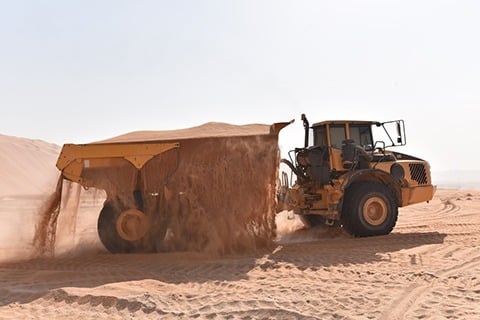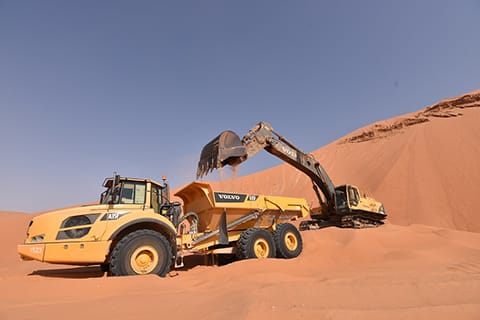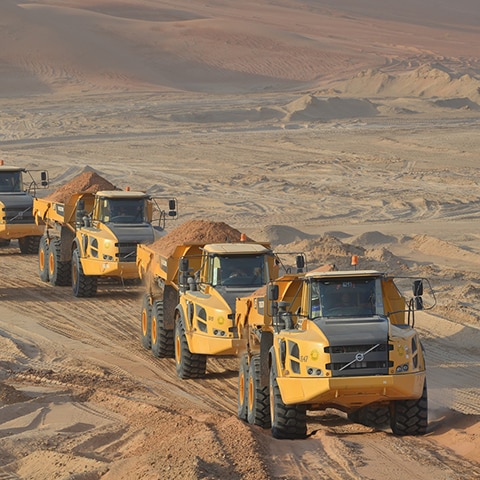Saudi Arabia has built the first ever highway through the world’s largest and most barren desert – the Empty Quarter – built with the help of a fleet of 95 Volvo machines.

‘Explored’ by British explorer, Sir Wilfred Theseiger, the desert itself is 620 miles (1,000km) long by 310 miles (500km) wide and surface elevation varies from 800 meters (2,600ft) in the southwest to sea level in the northeast. The terrain is covered with steep sand dunes with heights up to an incredible 250 meters (820ft).
The Empty Quarter has been an unforgiving natural barrier between the Kingdom of Saudi Arabia and the Sultanate of Oman for centuries. In 2010, Al-Rosan Contracting was one of the contractors hired to build the first ever road connecting the two locations, consisting of a 519 km-long highway, built using Volvo Construction Equipment (Volvo CE) machines. The longest part of the road which Al-Rosan Contracting was commissioned to build (256 km) comprises a single-lane carriageways and in sections where there are steep inclines, secondary lanes are added for trucks and slower-moving traffic.
Challenging conditions
“The entire project was a challenge from day one whether it was the climatic conditions, topography of the area, the distance from the nearest inhabited city or availability of spare parts, logistics and services,” said Fahad Hazza Aba Alros, general manager of Al-Rosan Contracting.
Trying to build a road on shifting sand dunes was always going to be difficult. The project involved building sand bridges across salt flats and high rising dunes, so the selection of adaptable and reliable equipment was critical for this project, not least because of the aggressive environment, intense heat, sand and remoteness of the site.
“Al-Rosan Contracting selected FAMCO (Al-Futtaim Auto & Machinery Co. LLC), as its equipment partner because of our reputation, the quality of our products and the continuous technical and logistical support that we provide,” says Amal Almizyen, managing director at FAMCO – Saudi Arabia – the exclusive distributor of Volvo Construction Equipment machines in United Arab Emirates and Kingdom of Saudi Arabia.
“We entered the Saudi market in 2011 by acquiring an existing Volvo CE dealer,” says Paul Floyd, Senior Managing Director – FAMCO Group. “Since then, we have been delighted to serve customers the Al-Futtaim way, and of course, with Volvo CE’s outstanding support and machines, we are making an impact in this important construction market. The road through Rub’ al Khali is a fine example of how service, product support, customer engagement and on-site maintenance all came together for the contractor. This is a project that is extremely important to Saudi Arabia’s infrastructure development and we are extremely proud of being part of this iconic but ambitious project, and rising to the challenge. The strategic importance of this project represents a key addition to both FAMCO’s and Volvo’s record of achievements.”

“The challenges were mainly the climate and enormous amounts of sand moving,” says Eslam Reddah, workshop supervisor, Al-Rosan Contracting. Volvo Construction Equipment machines were chosen because of their reliability in extreme conditions.”
The construction of the 256 km road was completed in sections and involved gigantic amounts of sand ‘cut and fill’. The sand transported to construct the bridge was 130 million m3 – the equivalent of 26 giant pyramids – and 12 million m3 of material was needed to protect the embankment of sand from wind and water.
The equipment was ordered throughout several stages of the project, totalling 95 Volvo machines, including a range of articulated haulers, excavators and motor graders. As the project progressed, a lead excavation team tackled the dunes while aiding the excavation and building of the raised surface and foundations for the road.
“The aim of this project was to directly connect two countries by road for the first time, making it easier for citizens to travel from the borders,” said Fayez M. Subbaheen, project manager at Al-Rosan Contracting.

Working in desert conditions
Hundreds of drivers, excavator operators, technicians and auxiliary workers – almost 600 in total – were employed over the three-year project. They lived in self-contained camps strategically designed with facilities to support this unique development. The remote location, 1,000km away from the capital Riyadh, presented FAMCO service and maintenance teams with a demanding schedule. This was manifested by the extreme desert temperatures, reaching 50oC degrees in the day and dropping to below 1oC at night.
Every day the construction team worked 14 hour shifts excavating and depositing sand that was then compacted using naturally salty ground water. The time constraints of this project depended on the Volvo machines working relentlessly.
“The future looks very promising,” says Fahad Hazza Aba Alros, general manager, Al-Rosan Contracting. “We believe in our partnership with FAMCO and if we have any big projects like this in the future we know exactly where to go for machines and support.”
The road was successfully completed and will soon establish a vital connection between the two Arabian Peninsula neighbours. It’s set to have a huge beneficial impact for people and businesses travelling between Saudi Arabia and Oman, as the direct route through the desert will reduce journey times dramatically.
Tags Volvo CE
 Constructionshows
Constructionshows